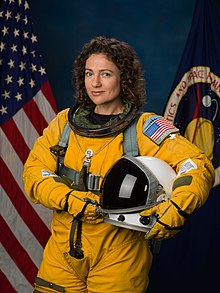
Back Jessica Meir AN جيسيكا مائير Arabic جيسيكا مائير ARZ Jessica Meir AST Джесика Меир Bulgarian Jessica Meir Catalan Jessica Meir Czech Jessica Meir German Jessica Meir Esperanto Jessica Meir Spanish
Jessica Meir | |
|---|---|
 | |
| Born | Jessica Ulrika Meir July 1, 1977 Caribou, Maine, U.S. |
| Citizenship |
|
| Education | |
| Space career | |
| NASA astronaut | |
Time in space | 204d 15h 19m |
| Selection | NASA Group 21 (2013) |
Total EVAs | 3 |
Total EVA time | 21h 44m |
| Missions | Soyuz MS-15 (Expedition 61/62) |
Mission insignia | |
| Scientific career | |
| Fields | |
| Institutions | |
| Thesis | Blood Oxygen Transport and Depletion: The Key of Consummate Divers (2009) |
| Doctoral advisor | Paul Ponganis |
| Other academic advisors | Bill Milsom (postdoc) Gerald Kooyman[1] |
Jessica Ulrika Meir (IPA: /mɪər/; meer;[2] born July 1, 1977) is an American NASA astronaut, marine biologist, and physiologist. She was previously an assistant professor of anesthesia at Harvard Medical School, Massachusetts General Hospital, Boston, following postdoctoral research in comparative physiology at the University of British Columbia.[3][4] She has studied the diving physiology and behavior of emperor penguins in Antarctica,[5] and the physiology of bar-headed geese, which are able to migrate over the Himalayas.[6] In September 2002, Meir served as an aquanaut on the NASA Extreme Environment Mission Operations 4 (NEEMO 4) crew.[7] In 2013, she was selected by NASA to Astronaut Group 21. In 2016, Meir participated in ESA CAVES, a training course in which international astronauts train in a space-analogue cave environment.[8] Meir launched on September 25, 2019, to the ISS onboard Soyuz MS-15, where she served as a flight Engineer during Expedition 61 and 62.[9] On October 18, 2019, Meir and Christina Koch were the first women to participate in an all-female spacewalk.
Meir was included in Time magazine's 100 Most Influential People of 2020.[10]
- ^ Kooyman, G. L.; Mastro, J.; Meir, J.U. (2023). Journeys with Emperors: Tracking the World's Most Extreme Penguin. University of Chicago Press. p. xiii. ISBN 978-0-226-82439-0. Retrieved November 1, 2023.
- ^ Cite error: The named reference
TimesofIsraelwas invoked but never defined (see the help page). - ^ Scott, Graham R.; Meir, Jessica Ulrika; Hawkes, Lucy A.; Frappell, Peter B.; Milsom, William K.; Llanos, Anibal J.; Ebensperger, German; Herrera, Emilio A.; Reyes, Roberto Victor; Moraga, Fernando A.; Parer, Julian T.; Giussani, Dino A. (July 1, 2011). "Point: Counterpoint "High Altitude is / is not for the Birds!"". Journal of Applied Physiology. 111 (5). American Physiological Society: 1514–1515. doi:10.1152/japplphysiol.00821.2011. PMID 21737822.
- ^ Roberts, Jason. "2013 Astronaut Class". NASA. Archived from the original on June 21, 2013. Retrieved June 19, 2013.
- ^ Knight, Kathryn (May 12, 2011). "Penguins continue diving long after muscles run out of oxygen". Science Daily. Retrieved November 17, 2011.
- ^ Arnold, Carrie (April 15, 2011). "Sky's No Limit in High-Flying Goose Chase". U.S. News & World Report. Retrieved December 10, 2012.
- ^ "Life Sciences Data Archive: Experiment". NASA. April 21, 2011. Archived from the original on March 22, 2012. Retrieved November 16, 2011.
- ^ Sauro, Francesco; De Waele, Jo; Payler, Samuel J.; Vattano, Marco; Sauro, Francesco Maria; Turchi, Leonardo; Bessone, Loredana (July 1, 2021). "Speleology as an analogue to space exploration: The ESA CAVES training programme". Acta Astronautica. 184: 150–166. Bibcode:2021AcAau.184..150S. doi:10.1016/j.actaastro.2021.04.003. hdl:11585/819077. ISSN 0094-5765. S2CID 234819922.
- ^ Graham, Gillian (September 8, 2019). "Astronaut from Maine prepares for takeoff". Portland Press Herald. Retrieved September 24, 2019.
- ^ "Astronauts Christina Koch and Jessica Meir: The 100 Most Influential People of 2020". Time. Retrieved September 23, 2020.
© MMXXIII Rich X Search. We shall prevail. All rights reserved. Rich X Search